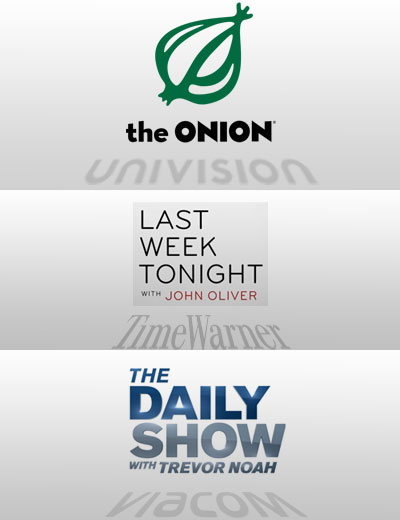
Satire Incorporated: The Onion, Univision, and the Media Oligopoly
The importance of satire to America's political discourse has been validated repeatedly in recent years. Studies by the Pew Research Center (2007) and the University of Delaware Center for Political Communication (2014) have indicated that viewers of shows such as The Daily Show, The Colbert Report and This Week with John Oliver are more aware of and better informed about political and social issues which may escape the spotlight of the mainstream media.
"Satire is the idiom of millenials," said Sophia McClennen, Professor of Comparative Literature and International Affairs at Pennsylvania State University. "It's the way through which many interact with society and politics."
While American satirists generally enjoy freedom from government censorship, there remain other forces with the potential to shape or limit political discourse, namely economic forces.
Put simply, in a free market economy, the most insightful and incisive satire is not always the most profitable. When a corporation acquires control of an outlet of social commentary - such as Univision's recently announced acquisition of The Onion - it raises questions about the potential impact of the new owners.
"When you're producing art in a capitalist society, it becomes a commodity," noted McClennen.
The Onion has been a privately held company since its inception in 1988. Generally eschewing ideology in favor of a good joke, it has always mined media trends for humor with a mercilessly non-partisan approach. Nonetheless the take-no-prisoners approach of The Onion's material has resulted in some remarkably astute commentary, correctly predicting the aftermath of the Iraq invasion in 2003, for example. Following 9/11, when even The Daily Show opted for a serious tone, The Onion responded with a landmark issue that instead gave the tragedy, and America's response to it, a fiercely ironic treatment ("The post 9/11 issue of The Onion was one of the most significant satirical moments in decades," said McClennen.) Consequently, the surprise acquisition of The Onion by Univision, a diversified media conglomerate which earns over $2.9 billion annually, caused pundits around the web to scratch their heads and ponder the potential fallout.
"Comedy is playing an expanding role in our culture as a vehicle for audiences to explore, debate, and understand the important ideas of our time," Univision Chief News and Digital Officer Isaac Lee said in a statement. "The Onion has been, and continues to be, a leading force of this phenomenon of intellectual, social, cultural and satirical commentary online."
It's a safe bet that Univision is more interested in The Onion as a vector for potential profit, rather than as a leading force for commentary. Collectively, The Onion's digital properties bring in over 25 million viewers a month. Moreover, in the past four years, The Onion has developed a new division, Onion Labs, which has helped ensure that the company remains profitable. Onion Labs is an in-house advertising agency that produces targeted stories for advertising clients, which The Onion then publishes and links to non-sponsored but thematically related stories. As of 2015, Onion Labs reportedly produced more than 80% of Onion Inc.'s total revenue. In other words, at least some of The Onion's content is already directly shaped by financial considerations.
Just because satirical content is sponsored, of course, doesn't mean that it need be less effective.
"Stephen Colbert has been very up front about some of his show's sponsors, and openly addressed his 'deal with the devil,'" said McClennen. "Sponsors don't mind if he mocks their products, because they realize that even if he's making fun of Wheat Thins, for example, the sketch still improves brand awareness. There's no such thing as bad publicity."
This raises the question of how disruptive or effective satirical commentary can be if sponsors are comfortable with it.
"Satire can mock the structures of corporate power because they're already known," said McClennen. "Most of it doesn't threaten these structures of power." Indeed, most media corporations appear to give satirists on their payroll relatively free rein. Even in instances where a satirist acts against the putative interests of his employers, it's rare to see an instance of corporate intervention or censorship. John Oliver, for example, broadcast a show on net neutrality in 2015 which was widely credited with giving a significant boost to the net neutrality movement at a critical moment in the Federal Communications Commission (FCC) deliberation of the policy. Following Oliver's broadcast, the FCC's commenting system crashed under a torrent of over 45,000 comments received over a single weekend. The FCC eventually ruled to preserve net neutrality (Time Warner, the parent company of HBO, which airs Oliver's show, vigorously opposed net neutrality.)
It's hard to know whether Univision, which has been accused of a distinct liberal bias in its coverage of political issues, will seek to steer its newest acquisition towards or away from any particular issues. Should this happen, however, other satirical outlets are likely to step up.
"The internet allows ‘citizen satirists' significant opportunities to gain enormous traction with sharp material," said McClennen. "If The Onion loses its edge, someone else will fill in the gap."




